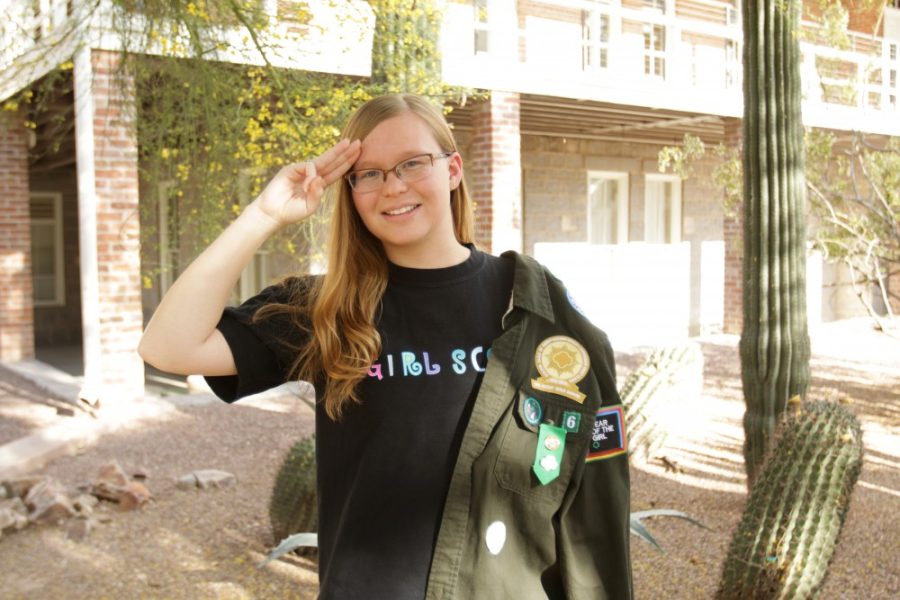Freshman Paige Brown recently received the Girl Scout Gold Award for creating Reading for All, a literacy program for children in Community Alliance Against Family Abuse (CAAFA), a domestic violence shelter in Apache Junction.
The Girl Scout Gold Award is the highest honor for a Girl Scout. To earn the Gold Award, each Girl Scout creates and leads a Take Action project that must have a sustainable impact in the community, so it can continue once the scout’s involvement is over. It takes around a year of work to complete a Gold Award project.
After CAAFA’s domestic violence shelter was damaged during the monsoon season of 2015, Brown was inspired to help.
“One of the things they lost was the literature–the small amount of reading materials they had for the kids,” she said. “And I thought: I’m going to build them a library.”
Brown, who is now majoring in Deaf Studies with an emphasis in educational interpreting ASL, spent her entire senior year of high school working on the project. After holding book drives at her school and elsewhere in her community, she collected over 2,000 books. Due to the overwhelming response, Brown was able to build two libraries for the shelter, both of which allow children to take the books once they leave. A yearly book drive held by the Soroptimist women’s volunteer organization replenishes the libraries.
RELATED: Festival of Books showcases literacy in Tucson
Brown didn’t stop there. She also established an enhancement program for the children in the shelter to keep track of their reading and set goals in order to make reading fun.
“My main goal above everything else was to improve literacy for at-risk children in my community,” she said. “That was the mission because strong foundation in reading takes you to the moon.”
After completing the project in summer 2016, Brown has returned to the shelter and is inspired by the news that the children’s test scores went up, and her library and enhancement program helped contribute to that. In March 2017 she was officially given the Gold Award.

“The award itself isn’t what drove me to do this,” Brown said. “I have done Girl Scouts my whole life. Even if there hadn’t been the fancy Gold Award tied into the project, it was still something that I felt strongly passionate about and I wanted to make that difference.”
After being in Girl Scouts for 13 years, Brown now works as a Troop Leader in Tucson. Her major in Deaf Studies is another interest that developed partly from her involvement in Girl Scouts. One of her goals is to bridge the language gap between English and ASL to mainstream deaf and hard-of-hearing students in the school system.
“My interest in the language itself came from Girl Scouts, but wanting to work with deaf people and bring that stigma of their culture to a minimum in our society is really more my calling and my passion,” Brown said. “It’s just something I feel so strongly about. I know that this is what I need to do with my life.”
Brown said part of the stigma stems from the difference of being “deaf,” as in not having the physical capability to hear, and “Deaf,” as in being immersed in the deaf culture regardless of functional hearing ability. The two do not always go hand in hand, leading to some controversy in the Deaf community.

RELATED: Deaf studies students work closely with the community
According to handspeak.com, about 90 percent of deaf children have hearing parents, and among deaf parents, 90 percent of their children are hearing. The latter population would be referred to as being in the “Deaf” community. There is a huge movement in society today to embrace the culture of being deaf, rather than embrace a mentality of disability and needing to be “fixed.”
“The deaf community and the deaf culture is alive,” Brown said. “Being deaf you can be anything else.”
Follow Breagh Watson on Twitter.









